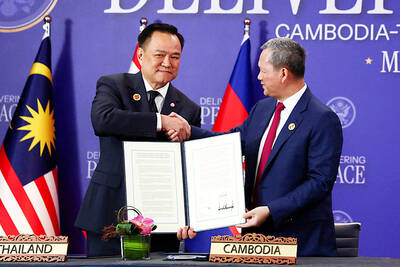President Fidel Castro has signaled he is itching for a return to public life after eight months of illness that has kept him out of sight, lambasting US biofuel policies in a front-page newspaper editorial.
But Castro's scathing attack in the Granma Communist Party daily on Thursday left questions unanswered: What future role will Castro play in domestic politics and government? When will he appear again in public?
In his article, the 80-year-old revolutionary asserted that US President George W. Bush's support for using crops to produce ethanol for cars could deplete corn and other food stocks in developing nations, putting the lives of billion people at risk worldwide.
"There are many other issues to be dealt with," Castro wrote at the end of his editorial, apparently promising more such missives.
Unlike several other written messages signed by Castro since he fell ill, this one did not seem aimed at dispelling rumors about his health and did not even mention that he has been sick.
"This shows a more aware and lucid Castro than that suggested by the wan pictures we've seen over the past few months," said Cuba specialist Wayne Smith, who served as the US' top diplomat in Havana from 1979 to 1982.
"My own take is that this does not presage some early return to power," Smith said. "Rather, it is a matter of Castro wanting to get his two cents in about a subject he cares much about."
Castro's future role has been the source of much speculation on and off the island, especially as senior Cuban officials and family members have given increasingly optimistic reports about his health.
Castro's condition and exact ailment remain a state secret, but he is widely believed to suffer from diverticular disease, a weakening of the walls of the colon that can cause sustained bleeding.
While some seem confident Castro will resume the presidency he temporarily ceded to his younger brother Raul Castro on July 31, others think the man still popularly referred to as "El Comandante en Jefe" -- Commander in Chief -- is more likely to take on a less physically demanding post as elder statesman, weighing in on international issues while Raul Castro and a new collective leadership handle daily domestic affairs.
Fidel Castro "no longer has the physical capacity to sustain his previous activity," said Manuel Cuesta Morua, a center-left Cuban intellectual and dissident.
Before he fell ill, Fidel Castro was famous for his exhausting schedule, often staying up all night to entertain visiting foreign leaders and speaking extemporaneously on live television for hours.
"This is his way of saying `I'm here!'" Cuesta Morua added.
Yet Castro has not appeared in public since turning over his presidential functions to his 75-year-old brother, the defense minister Raul Castro.

Shamans in Peru on Monday gathered for an annual New Year’s ritual where they made predictions for the year to come, including illness for US President Donald Trump and the downfall of Venezuelan President Nicolas Maduro. “The United States should prepare itself because Donald Trump will fall seriously ill,” Juan de Dios Garcia proclaimed as he gathered with other shamans on a beach in southern Lima, dressed in traditional Andean ponchos and headdresses, and sprinkling flowers on the sand. The shamans carried large posters of world leaders, over which they crossed swords and burned incense, some of which they stomped on. In this

‘NO COUNTRY BUMPKIN’: The judge rejected arguments that former prime minister Najib Razak was an unwitting victim, saying Najib took steps to protect his position Imprisoned former Malaysian prime minister Najib Razak was yesterday convicted, following a corruption trial tied to multibillion-dollar looting of the 1Malaysia Development Berhad (1MDB) state investment fund. The nation’s high court found Najib, 72, guilty on four counts of abuse of power and 21 charges of money laundering related to more than US$700 million channeled into his personal bank accounts from the 1MDB fund. Najib denied any wrongdoing, and maintained the funds were a political donation from Saudi Arabia and that he had been misled by rogue financiers led by businessman Low Taek Jho. Low, thought to be the scandal’s mastermind, remains

Near the entrance to the Panama Canal, a monument to China’s contributions to the interoceanic waterway was torn down on Saturday night by order of local authorities. The move comes as US President Donald Trump has made threats in the past few months to retake control of the canal, claiming Beijing has too much influence in its operations. In a surprising move that has been criticized by leaders in Panama and China, the mayor’s office of the locality of Arraijan ordered the demolition of the monument built in 2004 to symbolize friendship between the countries. The mayor’s office said in

FIGHTING CONTINUES: Thai military dropped 40 bombs on border areas, Cambodia said, while Bangkok said Phnom Penh launched heavy attacks and damaged homes Cambodia yesterday accused Thailand of intensifying its bombardment of disputed border areas, even as officials from the two countries attend a multi-day meeting aimed at negotiating an end to deadly clashes. The neighbors’ long-standing border conflict reignited this month, shattering an earlier truce and killing more than 40 people, according to official counts. About 1 million people have also been displaced. Cambodian and Thai officials were in their third day of talks at a border checkpoint, with ministers of defense from the two countries scheduled to meet today. However, the Cambodian Ministry of National Defense said Thailand’s military carried out a heavy